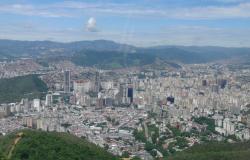China, Trump, and Regime Change in Venezuela

Alfredo Toro Hardy argues that the main reason for Trump’s targeting Venezuela for regime change is geopolitical, not drug related.
From its issuance of the Monroe Doctrine in 1823, when it warned European powers of its willingness to go to war to preserve the inviolability of the Western Hemisphere, the United States sought to assert its undisputed primacy upon it. So thorough was its grip over its own hemisphere, that the American Congress rejected the country’s adherence to the League of Nations, after World War I, because it would constrain the unilateral imposition of its will upon Latin American countries. As Henry Kissinger explained: “The League was believed to be incompatible with the Monroe Doctrine because collective security entitled, indeed required, the Legue to involve itself in disputes within the Western Hemisphere” (Kissinger, 1994, p. 372).
Jumping into the U.S.’ backyard
Since the late twentieth century, but particularly with the arrival of the twenty-first century, this grip loosened in a surprising way. Nothing exemplified this better than China’s sudden economic assertiveness in Latin America. This led some analysts to talk about Beijing’s “jumping the fence that guarded the U.S. backyard”, while others maintained that China was no longer willing to “show the deference of the past towards the American backyard”. (Paverman, 2011; Urcuyo, 2014).
This unexpected appearance of China in the Latin American scene not only broadened the region’s economic options but, by extension, its political room of manoeuvre as well. Not surprisingly, a pink wave covered most of the region during the first decade of the century, with left-wing governments sweeping through it. This effectively halted the expansion of Washington’s proposed Free Trade Area of the Americas.
Between 2000 and 2010 Latin America’s exports to China grew by 370%. Meanwhile, between 2003 and 2013, trade between China and Latin America grew at an annual rate of 27%. For more than a decade now, China has been the region’s largest source of financing. It has also been South America’s largest trading partner, and the second largest one for Latin America as a whole. Not a small feat, considering that in 1990 only 0.6% of Latin America’s total imports came from China. In terms of investments, China’s outward investment in Latin America reached US$693.740 billion in 2021. All along this process, the United States remained essentially passive (Gallager and Porzecanski, 2010, p. 37; Delvin and Khan, 2016, p. 51; Roy, 2022; SELA, 2012; CEIC, 2023).
However, certain voices within the U.S. manifested their concern. The head of the U.S. Army Southern Command, General Douglas Frasser, expressed before the House Armed Service Committee on March 6, 2012, that the country was “losing its positional advantage in the hemisphere” and that “immediate action was needed to reverse this trend”. His successor on the job, General John Kelly, made similar remarks before the same Committee on March 20, 2013. Meanwhile, several American scholars have warned, in appearances before the House Foreign Affairs Committee, about the risks of allowing an open-door policy towards China in the hemisphere (Urcuyo, 2014). Those words, however, were not followed by deeds. No doctrine, formal complaint, or overt friction with China ever materialized in this regard.
Why Venezuela?
At least not until Trump 2.0, who wants to (re)emphasize America’s dominance over the Western Hemisphere. Referring to him, Edward Wong wrote in The New York Times:
“His actions and statements suggest he might be envisioning a world in which each of the three so-called great powers - the United States, China and Russia - dominates its part of the globe, some foreign policy analysts say…‘The best evidence is Trump’s desire to expand America’s overt space of influence in the Western Hemisphere’, said Stephen Wertheim, a historian of U.S. foreign policy at the Carnegie Endowment for International Peace” (Wong, 2025).
Could this be the real reason behind Trump’s intent on bringing about regime change in Venezuela? Mike Froman believes so:
“For President Donald Trump, Venezuela has become ground zero for his 21st-century corollary of the Monroe Doctrine - an experiment in power projection ostensibly motivated by a new war on drugs and rooted in the president’s belief that hemispheric dominance is a national security imperative” (Froman, 2025).
If that is the case, hemispheric dominance seems much more salient than drugs in relation to Maduro. Indeed, the latter’s regime does not pose any significant drug threat to the United States. As the reputed Brussels-based International Crisis Group states:
“All the fentanyl entering the U.S. is produced in Mexico. According to the U.S. Customs and Border Protection, 94 per cent of the drug seized in the U.S. is intercepted in the southern border. Venezuela does serve as a transit country for cocaine produced in South America, but most of this heads to Europe while only a minuscule share is trafficked to the U.S.” (International Crisis Group, 2025).
If “hemispheric dominance is a U.S. national security imperative”, China is certainly the main intruder. No other extra continental power comes close to China in terms of its hemispheric encroachment. But then, why Maduro and not any other of Beijing’s regional economic partners? Perhaps because of the following reasons.
First, Chinese financing in Venezuela reaches US$62.3 billion, almost 50% of all Latin American debt to China, a debt to be paid in future oil production. Hence, the largest world oil reserves have been mortgaged to Beijing for years to come. Second, Maduro’s Venezuela is not only China’s economic partner but also a close geopolitical ally. Indeed, it not only unconditionally supports Beijing in causes such as reunification with Taiwan, the South China Sea disputes, or the National Security Law in Hong Kong, but follows China’s revisionist worldview. Maduro has bought the whole Chinese package and not just the economic part of it, as the majority of Latin American countries have done. Third, Venezuela has also bought the whole Revisionist Axis package, which in addition to China also includes its political allies – Russia and Iran (as reaffirmed by Maduro reaching out to China, Russia and Iran for military help in the face of the U.S.’ threat, as recently reported by The Washington Post) (Piña, 2025; Faiola, Natanson, Ilyushina and Herrero, 2025).
Message and irony
Venezuela thus presents itself as an outlier within the context of Latin America’s relations with China. Within the Cold War between China and the U.S., Caracas is not in the same league as Brasilia, Buenos Aires, Santiago or Lima. While the latter are just involved in an active economic partnership with China, Venezuela has also become its geopolitical associate.
While targeting Venezuela, Trump certainly aims at providing a dissuasive example to others in the region. It has been argued that through it, he wants to send a clear message to drug producers and traffickers all around Latin America, particularly in Mexico. Presumably, and fundamentally, he also wants to send a clear message to the rest of the countries of region that he will not tolerate that Latin America becomes the U.S.’ soft underbelly in the context of the current great power rivalry. He has put them in notice as to his displeasure for their closeness with China, and has set the limits of what is acceptable in their relations with Beijing and other extra continental powers.
Ironically enough, though, by imposing a 50% tariff on Brazil on account of former President Bolsonaro’s trial, or by stating that he wants the Panama Canal back, or by playing hardball on tariffs, or by treating Latin American illegal immigrants in the U.S. as dangerous criminals, he is pushing the region into China’s arms in a way that none of his predecessors ever did.
Alfredo Toro Hardy, PhD, is a retired Venezuelan career diplomat, scholar and author. Former Ambassador to the U.S., U.K., Spain, Brazil, Ireland, Chile and Singapore. Author or co-author of thirty-six books on international affairs. Former Fulbright Scholar and Visiting Professor at Princeton and Brasilia universities. He is an Honorary Fellow of the Geneva School of Diplomacy and International Relations and a member of the Review Panel of the Rockefeller Foundation Bellagio Center.
By Olga Berrios - Flickr: caracas desde el ávila, CC BY 2.0
References
CEIC (2023). “China Outward Investment: Accum: Latin America 2003-2023”.
Delvin, Robert and Kahn Theodore (2016). “Latin American Trade with India and China” in Roett, Riordan and Paz, Guadalupe (Editors), Latin America and the Asian Giants. Washington D.C.: Brookings Institution Press.
Faiola, Anthony, Natanson, Hannah, Ilyushina, Mary and Herrero, Ana Venessa (2025). “As U.S. ramps up pressure, Venezuela pleads with Moscow and Beijing for help”, The Washinton Post, October 31.
Froman, Mike (2025). “Much ado about Maduro”. Council on Foreign Relations, October 24.
Gallager, Kevin P. and Porzecanski, Roberto (2010). The Dragon in the Room. Stanford: Stanford University Press.
International Crisis Group (2025). “Beware the Slide Toward Regime Change in Venezuela”, 23 October.
Kissinger, Henry (1994). Diplomacy. New York: Simon & Schuster.
Paverman, Lawrence (2011). “China looks to Venezuela for energy security”, WorldPress.org, October 11.
Piña, Carlos Eduardo (2025). “Venezuela Background”, The People’s Map of Global China, 24 October.
Roy, Diana. (2022). “China’s Growing Influence in Latin America”, Council on Foreign Relations, April.
SELA (2012). “La crisis en la zona del Euro”, 17-19 de octubre.
Urcuyo, Constantino (2014). “La Presencia de China en América Latina: Dragón Consumista, Comerciante y Prudente”, Political Outlook de América Latina 2013, Observatorio Político de América Latina y El Caribe.


